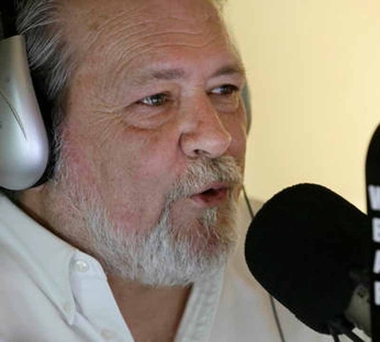Divided America: Seeing options shrinking, white men ask why

Dallas (AP) — The voices cascade into the studio, denouncing political hypocrisy and media bias and disappearing values. Hillary Clinton is a liar and a crook, they say; Donald Trump is presidential and successful. By the time the 16th caller reaches the air this day, the Rick Roberts show has reached an impassioned crescendo of anger and lamentation.
Roberts, WBAP's bearded, rodeo-roping, husky-voiced host, has heard enough, and he is primed with a message for his listeners.
"I want my country back," he begins.
He repeats that sentence a half-dozen times in a 4½-minute rant that darts from fear of crime to outsourced jobs to political correctness. He pans soulless politicians and has-been celebrities and psycho-babble hug-a-tree experts; he pines for a time when everyone spoke English and looked you in the eye and meant what they said. It's a fervent soliloquy that dismisses transgender people and calls for faith to regain public footing and for economic opportunity to return.
"I want America to be America," he says. "I don't recognize this country anymore."
This is a white male voice preaching to a largely white male audience that has expressed similar sentiments, in dribs and drabs, in hushed watercooler conversations and boisterous barroom exchanges and, most of all, in the course of a presidential campaign in which Trump has become their champion and their hope.
At this moment in American history, to be white and male means, for many, to feel centuries of privilege and values slipping away. To many others, the notion of white men being marginalized is ludicrous, their history a study in privilege. But data show some real losses, even as they maintain advantages:
—Whites' household net worth fell dramatically in the Great Recession. (But the declines of blacks and Hispanics were far larger, and whites still have an average net worth about 13 times greater than blacks and 10 times greater than Hispanics.)
—White home ownership is down from a decade ago. (But black and Hispanic home ownership, already lower, dropped at a far sharper rate.)
—White women have overtaken men in earning college degrees. (But white men still hold a big educational advantage over blacks and Hispanics.)
—The number of incarcerated white men has ballooned. (But black and Hispanic men remain far more likely to be jailed.)
—Fueled by suicides, drug overdoses and alcohol-related illnesses, mortality rates for middle-age whites have increased even as they continue to fall among middle-age blacks and Hispanics. (Still, white men continue to have a longer life expectancy than black men, though shorter than Hispanics.)
No one cites metrics like these on air this day, but it's clear some of the listeners have felt their toll.
Stephen Sanders is 49 and was once an X-ray technician. He says his skill and seniority were ignored when he applied for a supervisory job that ultimately went to a black candidate. When Trump announced his candidacy, Sanders was thrilled to hear someone give voice to his feelings about immigration and outsourcing and restoring opportunity for guys like him. He felt he was seeing decades of painful history starting to be reversed. He wants to live a better life than his father, but he doesn't.
"The theme about the American experience is to get better and to do more," he says. "I've never experienced it. I've always struggled."
Jon Hayes also dials in this day. He is 55 and once owned a construction business. It folded and he lost his house, he said, when it became impossible to compete against the cheap labor of immigrants who came to the U.S. illegally. He fell back on a career in auto mechanics and hoped to retire this year, but has put it off. A grown son still lives at home, and for all the setbacks Hayes has had, he believes he's still able to say something that he's not sure the 29-year-old will: He achieved a better life than his parents.
"I just don't think the opportunity is out there now that there used to be," he says.
They are far from alone in their pessimism. A Kaiser Family Foundation-CNN poll released in September compared white college graduates and the white, black and Hispanic working class. Working-class whites were least likely to say that they're satisfied with their influence in politics, that the federal government represents their views, and that they believe their children will achieve a better standard of living than them. They were most likely to say it has become harder to get ahead financially and find good jobs in recent years, and to blame economic problems on the federal government and immigrants working here illegally.
Roberts, 53, sees the hurt across the U.S., but dismisses the idea of white privilege. His parents were never in his life, he says. He was left with grandparents and, when they grew too old, he was emancipated at age 15 and landed at a boys' ranch. He went on to earn an MBA and law degree and shifted 22 years ago to begin a life in radio.
He first delivered his "I want my country back" rant, impromptu, about two years ago on one of those days when his listeners' despair was overwhelming. He keeps an MP3 of the audio on his computer and airs it every now and again when it seems right. He clicks the file this afternoon and it begins to play.
"I want my country back, and the only way, the only way I'm ever going to be able to get this country back is if I reach out to the brothers and sisters that all feel the very same way and say, 'Hell, no, you can't have the country.'
"Stop it! How many different ways do we say stop it!?"
By Matt Sedensky, Associated Press. Copyright 2016 The Associated Press. All rights reserved. This material may not be published, broadcast, rewritten or redistributed.
The Gayly – October 20, 2016 @ 2:10 p.m.





